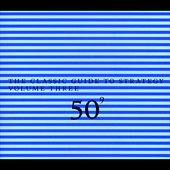| All Artists: John Zorn Title: The Classic Guide to Strategy, Vol. 3 Members Wishing: 2 Total Copies: 0 Label: Tzadik Release Date: 11/23/2004 Genres: Jazz, Pop, Classical Styles: Avant Garde & Free Jazz, Chamber Music, Historical Periods, Modern, 20th, & 21st Century, Instruments, Electronic Number of Discs: 1 SwapaCD Credits: 1 UPC: 702397500926 |
Search - John Zorn :: The Classic Guide to Strategy, Vol. 3
 | John Zorn The Classic Guide to Strategy, Vol. 3 Genres: Jazz, Pop, Classical
|
Larger Image |
CD Details |
CD ReviewsA stunning demonstration of solo saxophone. Michael Stack | North Chelmsford, MA USA | 05/16/2005 (5 out of 5 stars) "In the mid-1980s, John Zorn recorded two LPs worth of solo performances, released as the first two volumes of "The Classic Guide to Strategy" (and now available as a single CD on Tzadik). What is on those performances is the sound of a musician ten years into his career, having pioneered a unique system for organized improvisation (game pieces) that would be the pinnacle of the career of almost any other, showing his rather stunning and often unique technique as a reed player, and his incorporation of game calls into music. Loosely categorizable as jazz, these recordings are the obvious child of Braxton's "For Alto", but by someone with a more varied array of sound and expression on his instrument.
It took twenty years after volume 1 and seventeen after volume two for this volume three to appear (Zorn states in his liner notes to volumes 1 & 2 that this was originally intended to be five volumes). In that time, the man who had already established his legacy reinvented himself dozens of times, showing a restlessness rarely seen in music (Miles Davis comes to mind) and leaving behind a series of masterpieces whose only link seems to be that only John Zorn could have recorded them. Had Zorn done nothing but game pieces, he would still be legendary (if only critically). Had he done nothing but Naked City, he would still be revered by fans of dozens of genres. Had he done nothing but Masada, he would still be recognized as a genius of modern music. Had he done nothing but his chamber music, he would still be studied intensely. The list goes on. It is in this context that Zorn performed nightly during September of 2003 at Tonic in Manhattan's Lower East Side to celebrate his fiftieth birthday. Among the performances of this month was a show of solo alto saxophone performance, termed on disc as "The Classic Guide to Strategy Volume 3: The Fire Book". What Zorn illustrates with this is just how far his technique has come-- in the 40+ minutes on this performance, the playing ranges from smooth, gentle, keening to brusque, aggressive, and squealing. He plays with space-- using silence as counterpoints to his punctuated performance, or with density, sustaining for what seems to be minutes while somehow intertwining a melody in addition to his held note. Rhythmic figures, percussive tongue slapping, overblows, underblows... the pure range of technique he covers is, if nothing else, breathtaking. And when you think he's exhausted the full extent of his technique, he removes the mouthpiece from his horn and displays what he learned during his experimentation with game calls, providing a whole new array of expression, including a unique animalistic effect accomplished by dipping his mouthpiece into a cup of water. That the performance is engaging, powerful, and imbued with a sense of cohesion rarely expressed in solo performance on any instrument is even more amazing. It is my assessment that there is no peer of John Zorn in terms of the range of sounds and variety he can coax from his instrument, that there are few who can match him as an improviser, and that as a composer and especially an arranger, he is in a category all of his own. Playing with no other accompaniment allows all of these facets to come distinctly into focus. (Remarkable as this display is, Zorn does leave out his occasional performance of the sax without the mouthpiece, which results in a breathy, bassy sound out of the instrument-- this not being his full range of technique is quite frankly borderline unnerving) This is, in truth, not for everyone. You have to accept that your expectations as to the structure of music are likely not to be found here and allow the seemingly boundless talents of a master who never seems to find his peak to take hold. For any who enjoy adventurous music and can leave their notions behind, this is one of the great recordings. And to run the risk of sacrilege amongst those with a jazz background, I'd state this is the single greatest solo saxophone performance on record." |

 Track Listings (5) - Disc #1
Track Listings (5) - Disc #1